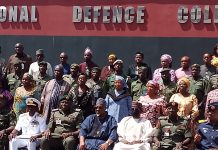The National Human Rights Commission (NHRC) has tasked community leaders in the North East to accept deradicalised repentant Insurgents who have expressed willingness to return to their communities and those already in their midst as a necessary step toward promoting peace and stability in the region.
The Senior Human Rights Adviser to the Executive Secretary who is also the Coordinator of the project on Reconciliation, Reintegration, and Transitional Justice for Borno, Adamawa, and Yobe states, Mr. Hilary Ogbonna made this call in Yola, Adamawa state when he led a team of the Commission’s staff and journalists on Community Immersion and visit to IDP Camp in Malkohi community, Yola South Local Government Area of the state.
During the visit, the Project Coordinator urged the community to be willing to accept deradicalised repentant insurgents, so as to facilitate their reintegration and eventual repositioning of the community on the path of sustainable development.
Mr. Ogbonna, noted that the non-judicial process of transitional justice has become necessary in the affected communities in Adamawa, as well as other communities in Borno and Yobe states since Nigeria may not be able to go through the tedious judicial process to prosecute the myriads of deradicalised repentant insurgents.
The Human Rights Advocate observed that judicial trial unlike the transitional justice system, does not address other aspects of justice such as reparations and restoration for the victims, which are necessary for reintegration of repentant and deradicalised insurgents into the community.
In his welcome remarks during the visit to Malkohi Community, the Ward Head, Mallam Abubakar Gidado expressed the willingness of members of his community to accept deradicalised insurgents into the society.
Gidado who spoke through his Secretary, Bashiru Aliyu said, “We are ready to accept deradicalised repentant Ex-Boko Haram combatants who were fully screened by the authorities under the Operation Safe Corridor”.
According to the Ward Head, the community had already accepted six persons that were deradicalised under the Operation Safe Corridor, in the past three years, who have been living peacefully in the community.
The six beneficiaries, he noted had since engaged in farming and trading activities, as their means of livelihood.
The team also visited an Internally Displaced Persons (IDPs) camp set up by the state government in Malkohi community and donated some items, such as bundles of footwear, cartons of indomie noddles and washing soaps to the inmates.
In his response, the Chairman of the IDPs camp, Umar Abubakar lauded the effort of the government, other humanitarian institutions and community members for their assistance and used the opportunity to plead for more humanitarian support for the IDPs.
Some of the IDPs who were interviewed by the journalists called on the government at all levels to provide them with the basic necessities of life in order for them to improve their living conditions and impact positively on their host community.
Earlier before the visit, Media and Communications Lead, Transitional Justice Project, NHRC, Fatimah Agwai Mohammed presented a training paper to the journalists titled, “Building Effective Media Partnerships and Networks for Transitional Justice and Reconciliation in North East Nigeria”.
She took the participants through the various roles journalists could play in promoting the Transitional Justice Project, saying that the language and style of reporting the processes of this nonjudicial justice system could make or mar the project, and by extension the entire society.
She, therefore, implored the media workers to always abide by the ethics of the journalism profession by ensuring a balanced, truthful and accurate reportage of all issues around the transitional justice system, which according to her deserves to be promoted by a network of journalists in the interest of human rights and social justice.













